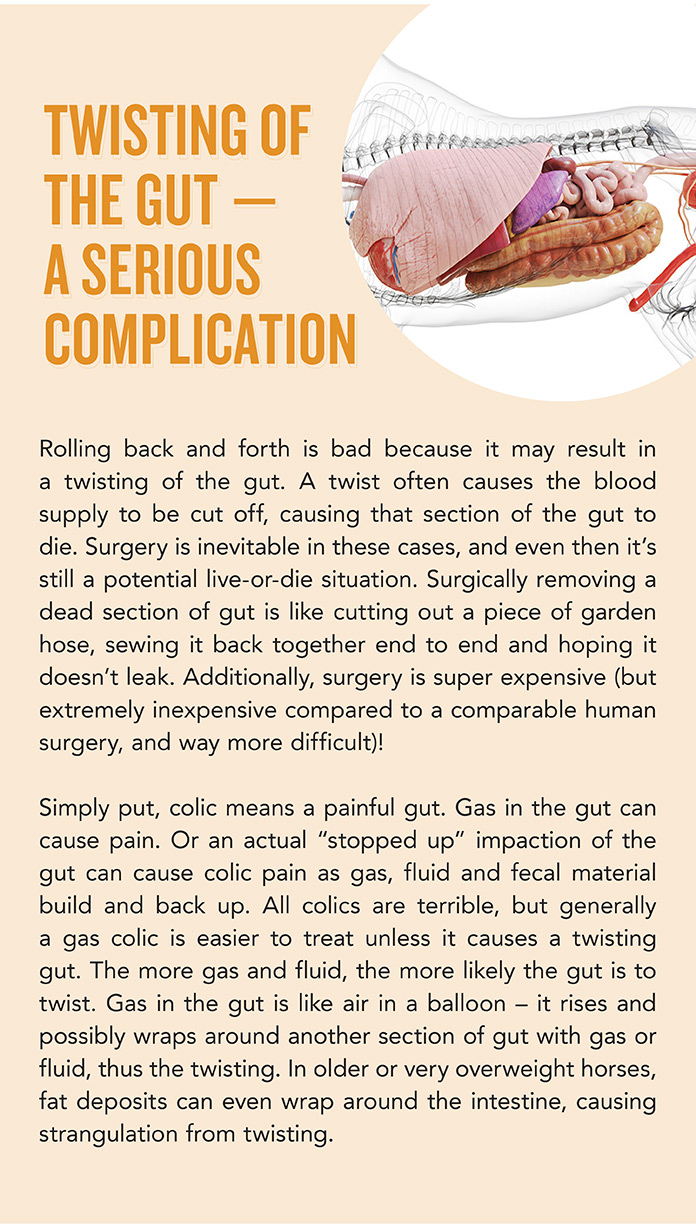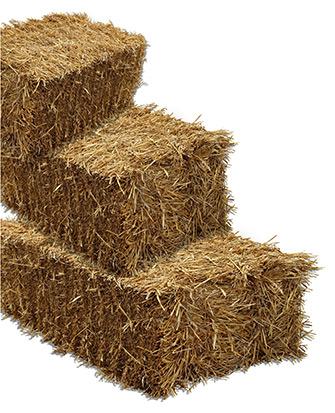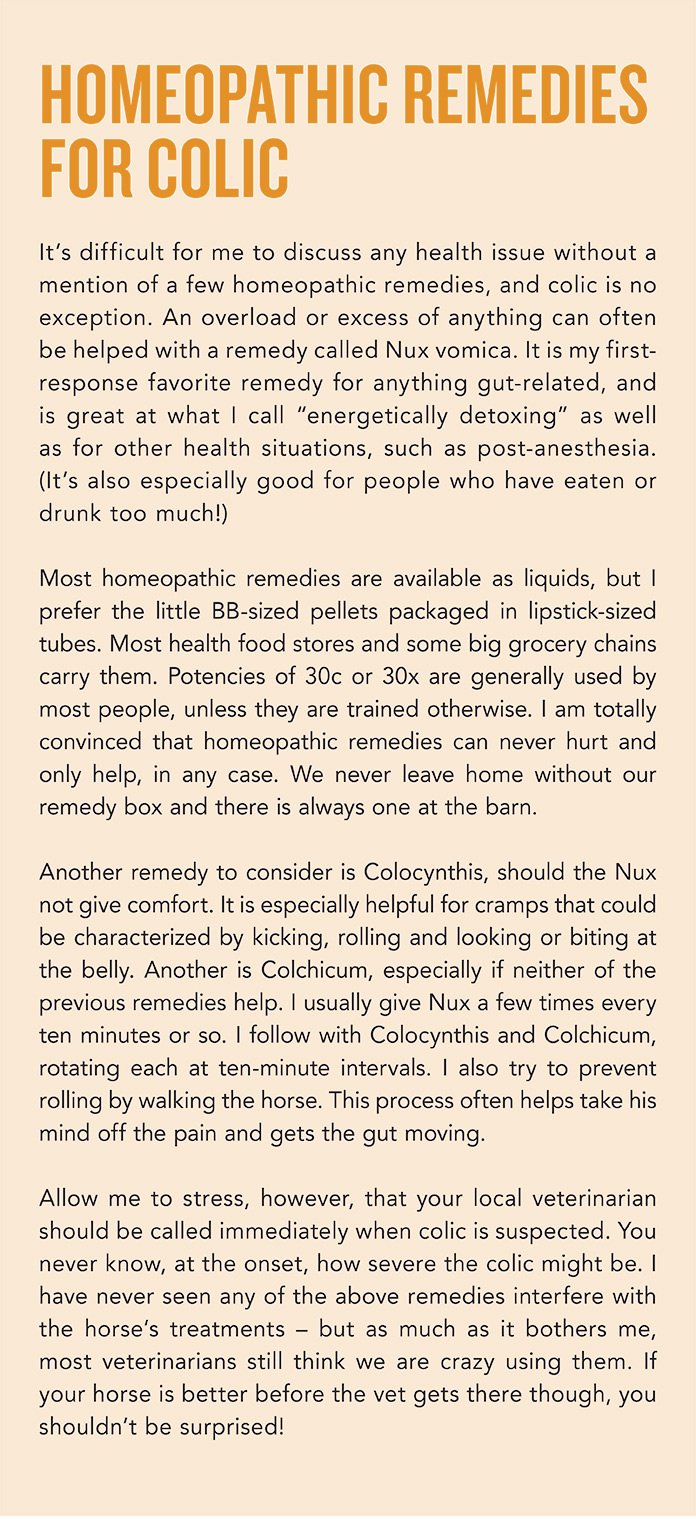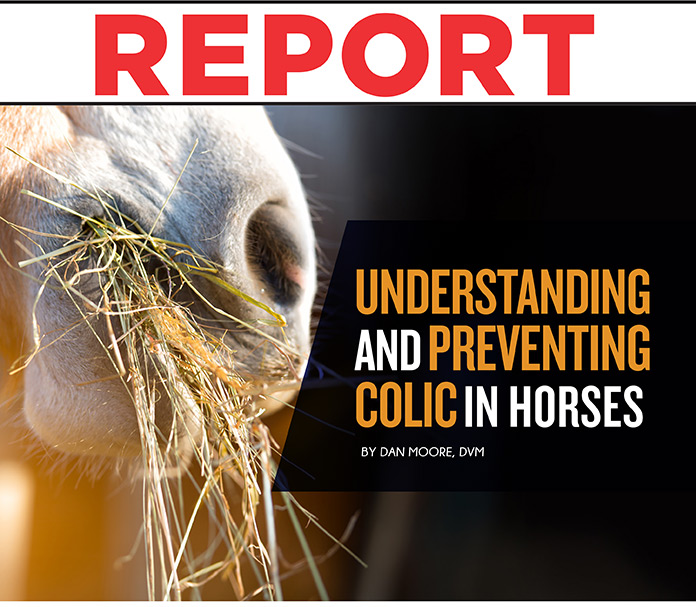Colic is a scary situation. But there are ways to prevent it, and things you can do for your horse to make him comfortable while the situation is resolved.
Colic is, to say the least, a scary situation — and possibly a horseperson’s worst nightmare! Time is always limited for getting a handle on the problem before it’s critical and life-threatening. There are many causes of colic. But there are also ways you can potentially avoid it, and things you can do for your horse to give him more comfort while the situation is hopefully resolved.
SYMPTOMS OF COLIC
The clinical signs of colic can differ depending on what is causing the pain. They can vary from “he just doesn’t look right” and a sort of glassy stare, to lying down and rolling from one side to the other, rolling over and over, getting up, lying down and rolling again. This can leading to a twisting of the gut. Biting and/or kicking at the belly are also common. Fortunately, it is generally obvious that the horse is hurting, so action can be taken. Bottom line — a horse with colic just can’t get comfortable — no matter what!
WHAT CAN CAUSE COLIC?
Too much feed at one time, whether hay or grain, can cause either gas or impaction. Changing quickly from one type of grain or hay to another can also lead to colic. Having too little water available is another culprit. Another common but often-overlooked cause is allowing a horse that is hot from exertion to drink too much water, or to feed him too soon. Horses should always be cooled after riding or any other manner of work, before they’re watered or fed.
Finally, parasites, especially round worms (ascarids) in young horses, can cause impaction by physically blocking the gut, not to mention all the other damage they can do as they migrate through various parts of the body. Fecal exams should be performed on a regular basis and deworming done based on results, not just a calendar rotation.

FERTILIZER OVERLOAD
Again, any change in the gut can cause colic! Most reasons so far mentioned are recognized and prevented by seasoned horse people. However, there is one cause for colic that has taken me years to figure out — fertilizer overload.
Yes, too much fertilizer applied over too short a period! Thus far, I don’t know of any other professional who has even considered this, much less spoken about it. I have been shouting it from rooftops for nearly two decades, yet it is still overlooked. I am certain it is a major cause of colic, if not the most likely cause. Abortion in mares, laminitis, even ulcers can also result from fertilizer overload. For lack of better terminology, the weakest link in any horse is where a problem occurs. In other words, a horse with already weak or bad feet who is exposed to a rapid change in the gut may develop laminitis — it’s sort of an endo-toxic effect. A pregnant mare exposed to a sudden change in the gut may abort due to a sudden bacterial change in the blood — a septicemia-type effect. An already-stressed horse exposed to a sudden change in the gut may develop ulcers. Potentially there are other possibilities, more than can be mentioned here.
So how in the world does a horse get too much fertilizer? How about from hay or grass? Hay is heavily fertilized, right? And fertilizer is what makes hay grow. The hay may be full of water drawn by the fertilizer into the grass before it is cut, which by weight puts money in the grower’s pocket. Fertilizer is used by almost every producer. It is made up of nitrogen, potassium and phosphorous.
Common ratios of these minerals are 10.10.10. Unfortunately, rather than using a more natural type of fertilizer, like manure, most people just spread the storebought versions. Nitrogen and potassium are the most deadly of the three minerals because excess amounts, not neutralized, change the gut pH by making it more acidic. Nitrogen and potassium are actually neutralized by firstly, salt; secondly, calcium; and thirdly, magnesium.
Horses cannot neutralize nitrogen or potassium overload fast enough by licking or chewing on a salt block, or a rock of any kind. Rocks and blocks for horses should never be used, in my opinion. Free-choice, always-available loose salt and minerals will prevent more issues than anything I know. We have proved it for nearly two decades, not only with our own 50-plus horses, but with tens of thousands of clients’ horses. Free-choice loose salt and minerals are critical to gut health, preventing colic and more. Keeping a little in a feed bucket and hanging the bucket on a fence post can prevent most major issues in horses. Even rain doesn’t negatively affect it.
While colic is a serious and potentially life-threatening condition, empowering yourself with knowledge about what to look for and what to do can give you more peace of mind.

Dr. Moore was ahead of the curve when he wrote about deworming from fecal exam results for Equine Wellness way back in March/April 2009, well before it became the commonly advocated practice it is today. Read about it here: equinewellnessmagazine.com/fecal-tests.
“Dr. Dan” Moore is a practicing holistic veterinarian, earning his Doctor of Veterinary Medicine in 1980 at Auburn School of Veterinary Medicine. Dr. Dan is the founder of The Natural Vet, an online source of information, products and services about natural alternatives to traditional drugs and chemicals for all species. He has combined more than 25 years of study in the field of herbal nutrition with completion of both professional and advanced courses in veterinary homeopathy. Dr. Dan has been featured on RFD-TV’s “At the Clinic” series and on the Outdoor Channel, and has written for many publications. An extensive library of articles, videos and recordings can be found at www.TheNaturalVet.net, where questions can be searched and/or submitted to www.AskDrDan.com. The office may be called toll free at 877-873-8838.
[su_button url=”https://facebook.com/EquineWellnessMagazine” target=”blank” style=”flat” background=”#e49127″ color=”#ffffff” size=”8″ wide=”yes” center=”yes” radius=”0″ text_shadow=”0px 0px 0px #000000″]Visit our Facebook page for more great content![/su_button]







